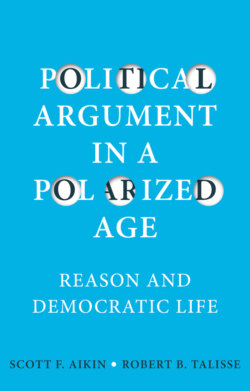Читать книгу Political Argument in a Polarized Age - Scott F. Aikin - Страница 9
Democracy as a Society of Equals
ОглавлениеIn order to address this question, we need to take a step back. Democracy is many things. It’s a form of constitutional republicanism in which all citizens are ruled not by government but by laws, a system of popular government, a procedure for collective decision, a method for electing public officials, a collection of fair processes by which conflicts among competing preferences are domesticated, a means for creating social stability, and so on. But underneath all these common ways of defining democracy rests its fundamental commitment to the moral ideal of collective self-government among political equals. This commitment to the political equality of citizens is what explains the familiar mechanisms of democratic government. Our elections, representative bodies, constitutions, and systems of law and rights are intended to preserve individual political equality in the midst of large-scale government. Absent the presumption of political equality, much of what goes on in a democracy would be difficult to explain. Why else would we bother with all of the institutional inefficiency, the collective irrationality, and the noise of democracy, but for the commitment to the idea that government must be of, for, and by the People, understood as political equals?
Even though democracy is hard to love, it is nonetheless beloved because it is a system of politics explicitly committed to our status as equals. To be clear, that commitment to equality does not involve the claim that everyone is the same, or equally good. Democratic equality rather amounts to the idea that, as far as politics goes, no one is another’s subordinate, superior, servant, or boss. In a democracy, no single person simply gets to call the shots for the rest of us. The political rules we live by are in some sense products of our collective political will. Although the function of government requires that certain people occupy offices that give them special power to do things like make laws, set policies, and give orders, that power is always constrained and the office holders are accountable to the citizens over whom their power is exercised. In a democracy, we collectively call our own shots.
Now, if everyone agreed about which shots to call, there would be no need for democracy, or any form of politics at all. But, as we all know, politics is fraught with disagreement. And some of this disagreement comes to more than mere foot stomping and horse-trading. That is, political disagreement is not confined to instances where different people merely want different things and have to strike a bargain. Political disagreement often runs deeper than this. It frequently involves conflicting judgments of justice, meaning, and value, differences among citizens concerning what we, collectively, ought to do. The familiar architecture of the democratic decision-making process – open elections, equal voting, and majority rule – serves to ensure that collective political decisions can be made in a way that each citizen can regard as fair, despite their ongoing disagreements. Recognizing that, in a society of political equals, no one person can simply call the shots for everybody else, democracy provides a system for collective decision-making in which, although we are sometimes required to abide by rules and decisions that we oppose, no one is rendered a subordinate, a mere subject of another’s will.
Three related points follow. First, democracy is never simply majority rule. Rather, democracy is a system of majority rule constrained by a constitution that identifies individual rights. These rights both recognize and protect each individual’s status as a political equal. Thus, in a democracy, there are some things that not even a vast majority of one’s fellow citizens can accomplish politically. Second, in a democracy, even when your side loses the election, you are never required simply to acquiesce in the outcome. You are permitted – and perhaps expected – to continue campaigning, objecting, and pressing for change after the votes have been counted. There’s always the next election, democratic collective decisions are revisable, and your rights guarantee that you still have an equal say. Third, in a democracy, part of what makes political power consistent with the political equality of the citizens is that democratic processes allow citizens to hold power accountable. Democracy calls on its citizens to hold office holders responsible for our collective life. Consequently, our role as citizens carries the duty to participate in the activities of self-government. In this way, political critique, challenge, resistance, and activism are all part of democracy.
When cast in this light, our enthusiasm for democracy is easier to understand. For all of its flaws, democracy is the proposal that we each are entitled to an equal say in directing our collective life. No one simply gets to boss everyone else around. Despite vast differences in knowledge, experience, moral character, talent, and ambition, we are in matters of politics one another’s equals. As citizens, we look each other in the eye. And in looking each other in the eye, we keep government under our joint scrutiny and in check. Far from being merely the least bad, democracy turns out to be positively dignifying. Accordingly, democracy is not only beloved. It is eminently lovable, deserving of our attachment to it.
